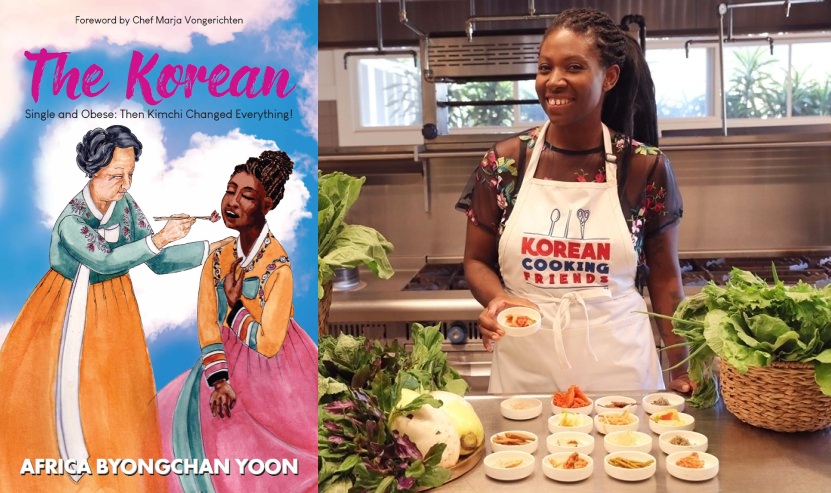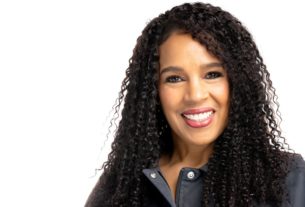In her book “The Korean: Single and Obese, then Kimchi changed everything! “, published in November 2021, Suzanne Engo (Now Africa Yoon), explains how the Korean dish “Kimchi” changed the course of her life.
Kimchi is a traditional Korean dish made from chillies and vegetables that have been lacto-fermented, i.e. soaked in brine for several weeks until acidity develops. There are hundreds of varieties of kimchi made with different vegetables as the main ingredients.
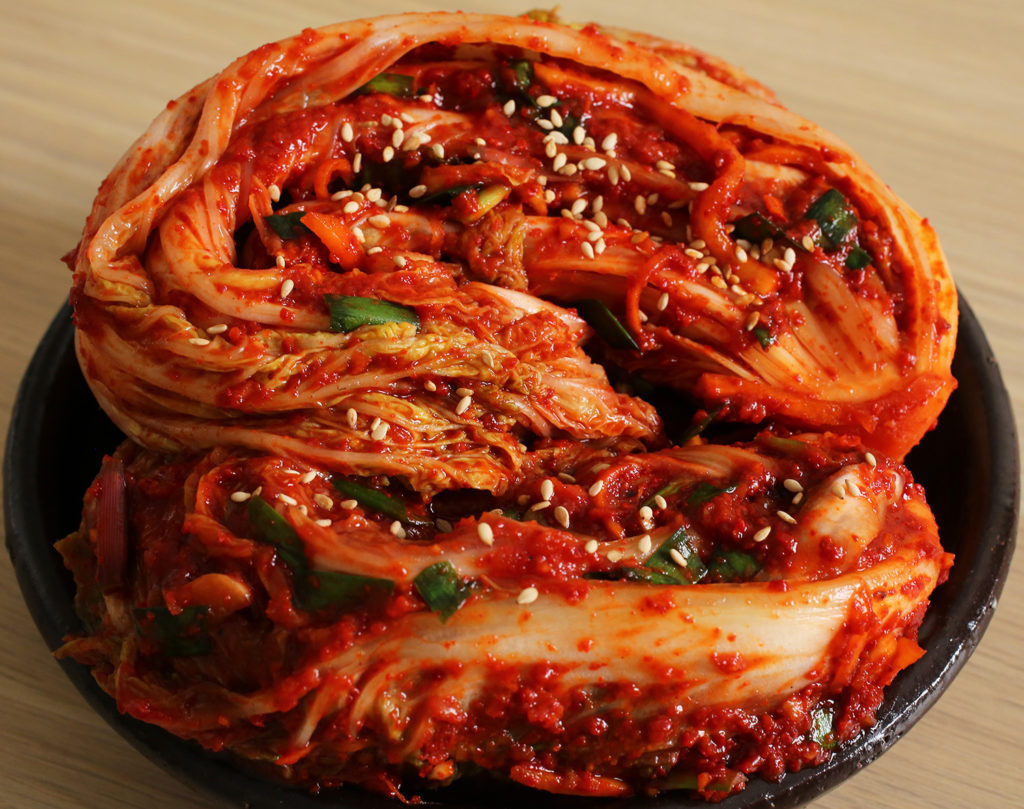
Originally from Cameroon, She is currently the CEO of Blackyoonicorn, a mommy and me cultural company that sells language and cultural toys for children, and affordable luxury global home goods for their mothers. She runs also the popular “Korean Cooking Friends” Facebook Group and cooking app by the same name. The Facebook group has over 50,000 subscribers.
Africa Byongchan Yoon née Suzanne Engo was about to turn 30. She was a celebrated activist working in Manhattan and around the world, when she finds she has gained 120 pounds and is now obese. She realizes she needs a life beyond her work and begins to dream about having a husband and children. To get her dream, she has to work on herself to get to her goal. The activist starts on the road toward the greatest cause of her career—to save herself—and decides she will do a spiritual and physical makeover to find self-love, in hopes it may lead to true love. An experience at a Korean grocery store in New Jersey changed her life completely when Africa Yoon was in her late 20s.
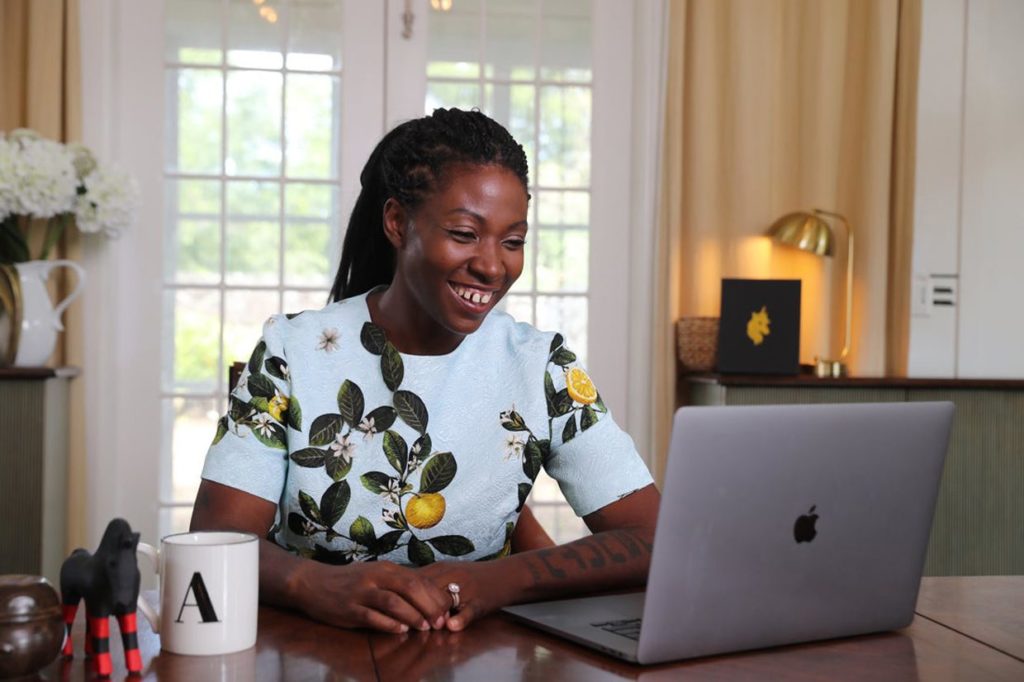
Back then she gained weight from stress coming from being an activist and when she was trying a sample of Korean cream bread, an elderly Korean woman told Yoon that she was “fat” and she should eat Korean food. Instead of being offended, Yoon asked the elderly woman, whom she later calls “halmoni” (the Korean word for grandmother), to help her and Yoon began to explore a whole new realm of Korean food and its ingredients. The two begin an unusual friendship that leads her to eating kimchi—and that moment changes everything. “When I ate the kimchi the halmoni gave me, I started to feel all the ingredients of Korean food. I was like feeling the food with all the senses. I was really starting to experience food in another way,” Africa Yoon told The Korea Times during an interview. Korea Times is the oldest English-language newspaper published in South Korea.
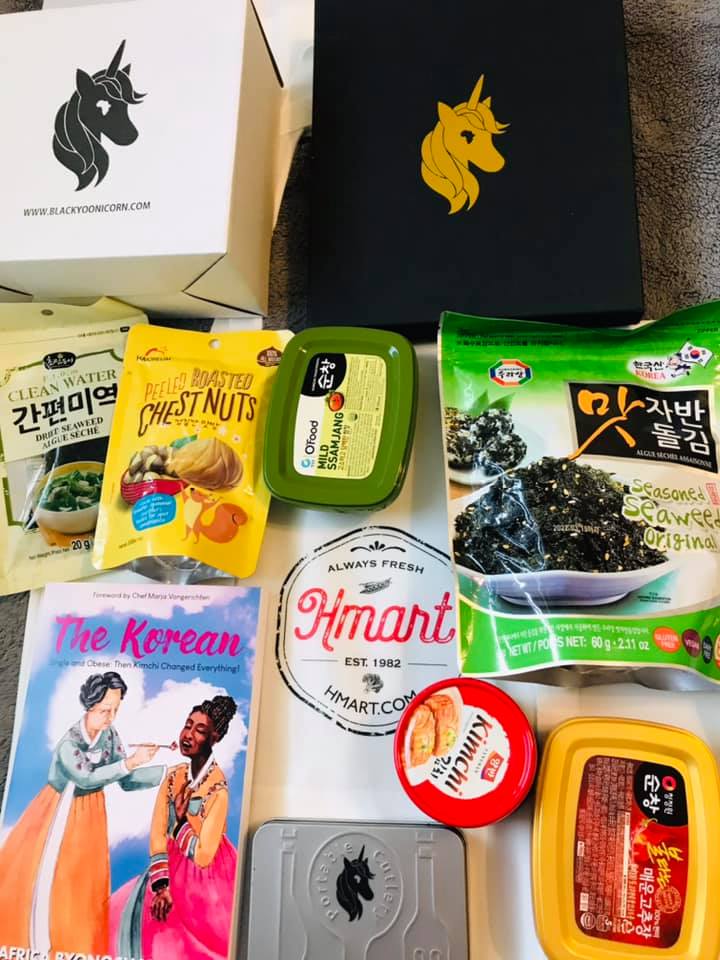
A thank you, a love letter to Korean people
According to Africa Yoon, her book, “The Korean”, is a thank you, a love letter to Korean people, particularly women. “The woman on the cover is Korean culture, a blend of all the women who nurtured me, from the halmoni in H Mart to my mother-in-law and other Korean American women. Also, because there is a tense history between Korean and Black people, I hope it will serve as a beacon of hope to unite us. In particular, I want to protect Asian elders who are in physical danger in the United States. To tell a story about their worth and to show a young black woman who an Asian elder helped, I believe is essential at this time. So why? Black Asian Solidarity”, she said to bestofkorea.com.
First encounter with Kimchi
However, says the Korea Times, her first encounter with kimchi was way back when she attended the United Nations school after moving to the U.S. at the age of six with her father who was Cameroon’s ambassador to the U.N. “I had a lot of different people from around the world as friends and so I ate a lot of different things at a lot of different places. Eating is what helps in global relations for people to get along, so that’s what made me so open to other foods,” Africa Yoon said. When a young boy brought kimchi to school, she had a chance to try it as one of many different foods from different parts of the world. “I actually liked the kimchi. In my culture, there is a small pepper that we have on the side of the table, so I became able to take spice. So when I ate kimchi, it was okay for me to taste it and I liked it since. But I thought about it only in terms of flavor”, Africa Yoon says to Korea Times.
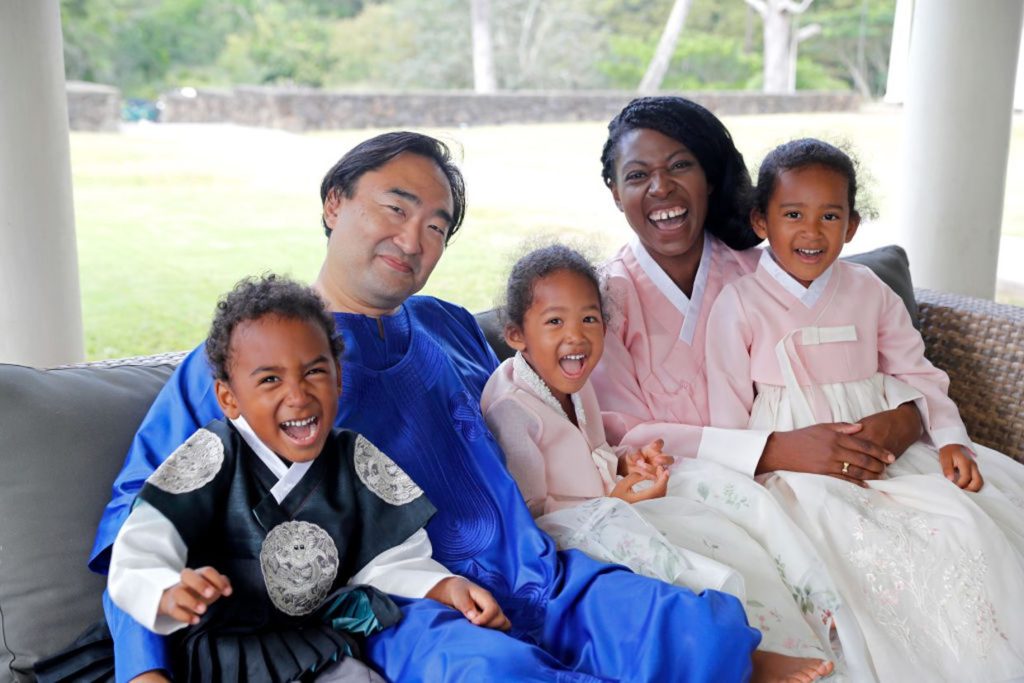
A benefactor who suddenly disappeared
Africa Yoon met the Korean elderly woman at the Korean grocery every Sunday and she helped Yoon shop for ingredients, which were mainly vegetable, to make Korean food. “If you look at Korean food, you will find so many vegetables. From my perspective, I really had such a variety of things and I think that’s what made me stick to being healthy, because I had so many choices,” Yoon said. The vegetable-centered Korean cuisine got her back in shape, both mentally and physically. Africa Yoon’s encounter with the halmoni, the newspaper says, ended rather mysteriously since her Korean food guide suddenly stopped coming to the Korean store on Sundays without explanation and nobody at the mart knew who the woman was. So, Africa Yoon said writing the book was one of her own ways of looking for the woman who suddenly appeared and disappeared from her life. “Because she was so important for me, I’m always looking for her in a way. When I see people (I imagine that) she’s somebody’s mom and that they are going to say ‘Oh, my mom told me about this. It was my mom.’ I wonder if marrying a Korean-American was part of me looking for her. She was tough. She loved me. I felt like I belong to her. She saved my life and she didn’t have to, but she did. My life is still benefiting to this day, from the things that she taught me”, she said.
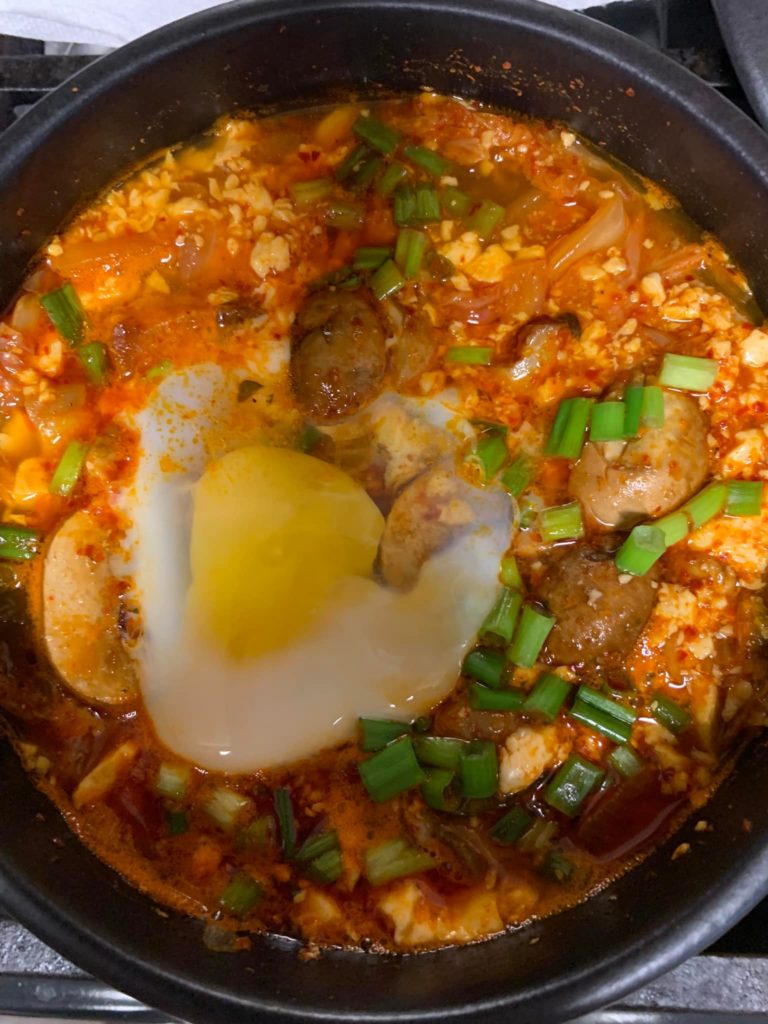
“I’m still and African”
Later, when the young Cameroonian-American got married to Korean-American, she not only changed her last name to her husband’s family name, Yoon, but also changed her birth name, Suzanne, to her activist nickname, Africa, to maintain her place of birth in her name. But even if, she changed her name, Suzanne Eyango said to bestofkorea.com that she is still an African and will always be an African American woman. “I was taught to be so proud of that. It is an unshakeable truth. My nose, dark skin, the way it turns golden when it greets the sun, the way I suck my teeth, the gap in my teeth, my feet and hands thick and robust. I mean my magnificent hair the way it is strong as rope and curly as the Sanaga River in Cameroon. The power in the way I walk into a room, good Lord, I am an African queen WALAAAAI !!! I am Black, and I am proud. Period. There will never be a new racial identity I carry. I can appreciate others, but man, does it feel good to be Black. Now, I am also the mother of Korean and Cameroonian American children, so I must rock a Hanbok with the same pride as I wrap my head in African fabric. I am too powerful not to include Korean culture in my ways on my kids’ behalf. I am influential because I made them. I continue to make them daily; even though they left my womb, I create them. So, you will see me including everything necessary to their development on my body. I will be inclusive of the story of both their grandmothers, whom I respect equally”, Africa Yoon said to bestofkorea.com.
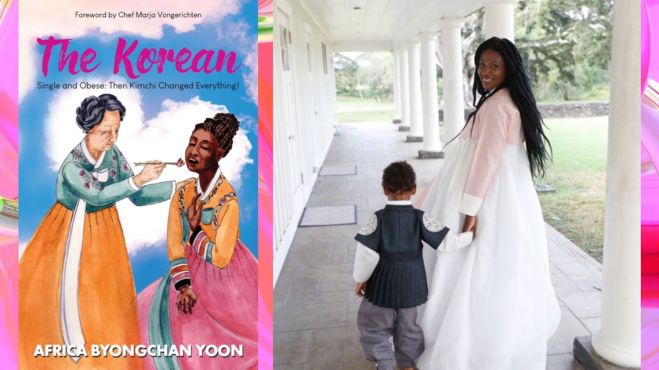
According to Korea Times, Kimchi saved Yoon’s health and life once again when she was suffering from grief after losing one of her twins during pregnancy and suffering thyroid problems.”I really thank Korean culture for my health and for my life. My life has been changed because of Korean food and Korean culture. Maybe my life and my experience with food has made me to be somebody that can talk about good relationships between people of different races so that people can see that we can get along if we can be open to each other’s culture, respect each other and dive into who other people and their cultures are,” Africa Yoon said to Korea Times.
Korean culture brought her back to nature
The author also said to bestofkorea.com that Korean culture changed her life because it brought her back to nature. “When you live by nature, you are closer to God and creation. That is also an African way, and it got me back to that. I have never eaten such a wide variety of fruits and vegetables as I have when eating Korean food. When I look at kaenip leaves and eat the leaf whole and raw, I feel it in my entire body. In the culture of Korean cuisine, I learned there is something called siwonhan-mat. It’s a third sense where you feel the food in your entire being. There is experiencing food for flavor and there is experiencing food for smell. Then there is an all-encompassing feeling with Korean food. When I eat kaenip or kimchi or any of the Korean foods, I feel my body come alive and I can feel the food as it travels inside of me, which is something I haven’t really experienced with another category of food. Perhaps with Indian food I feel a warming while Cameroonian food helps me rest, and Thai food makes me feel an awakening mostly in my head and sinus. But the feeling with every part of my body and being conscious of that? That is something I feel is unique to the ingredients of Korean Food. When I eat a leaf, I notice the leaves of the trees more, when I eat a root vegetable, I feel the earth and so on. Korean food as I speak about in The Korean is really a symphony to nature. It makes me want to become natural in every way. It reminds me that, like the banchan served on a table, I can choose in my life the elements that I need to create balance”.
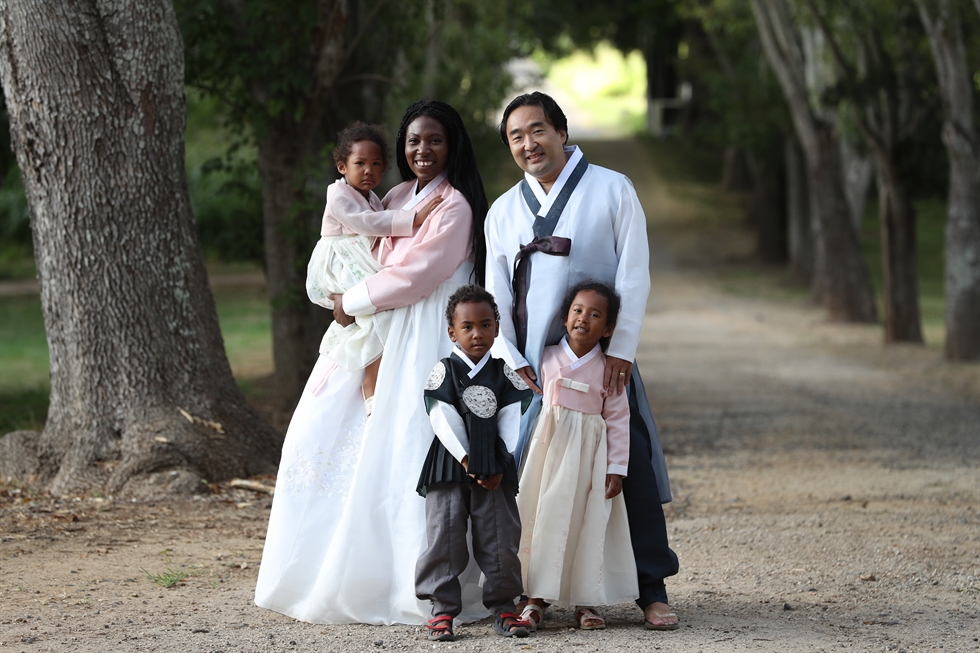
Author, television host and celebrated activist
Africa Byongchan (Ex Suzanne Engo) Yoon is an author, television host and celebrated activist known for working with young people on issues from education, poverty eradication, racism, at risk youth, obesity, bullying, sexual health and sport.
Born into a family of diplomats including an Olympian turned United Nations ambassador father, and activist mother, she is currently the CEO of Blackyoonicorn, a mommy and me cultural company that sells language and cultural toys for children, and affordable luxury global home goods for their mothers. With a passion for Korean food and health, she runs the popular “Korean Cooking Friends” Facebook Group and cooking app by the same name. The Facebook group has over 50,000 subscribers.
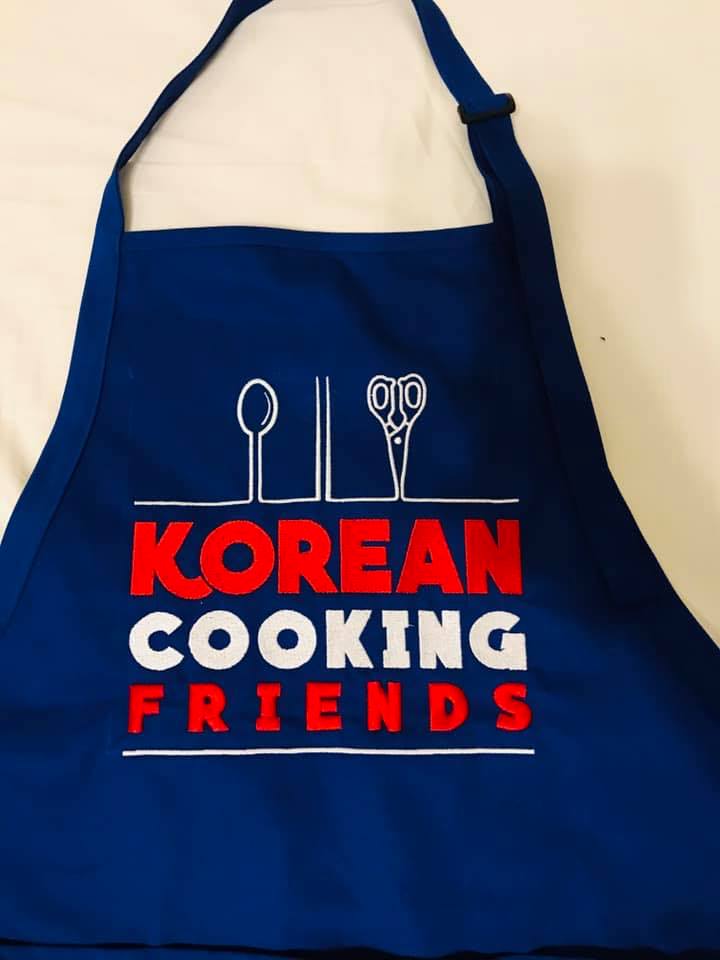
“I created a group to support other people who may have an interest in Korean food but have no guide. Korean Cooking Friends is for them, and for those looking to reconnect to Korean culture. We have many adoptees in the group, but it’s also for me. I still have loads of questions and that is why it is a group and not a page where I tell people how to make Korean food. It is a collective. I am not the leader; I am a member also. I also created a game for my children to learn to make Korean food. But while the opening images are to attract kids, the kitchen part of the game is more for adults. It’s called Korean Cooking Friends, just as my group is named. It takes you through every step of making my favorite Korean food. It is the first of many games Blackyoonicorn, our company will release where we will introduce children to foods from around the world. We just started with Korean cuisine”, Africa Yoon said to bestofkorea.com.
Prizes and awards
Africa Yoon was awarded the Golden Graal humanitarian prize in Rome for using film and television to educate about HIV/AIDS and named one of the Top 40 Youth Activists in the world by MTV and the Kaiser Family Foundation in her late teens. She has spoken around the world including the United Nations and is recognized for ending her speeches in song and dance. A graduate of New York University / Tisch School of the Arts, Mrs. Yoon bridges culture, activism and entertainment in all her projects.
Africa Yoon lives in Oahu, Hawaii with her husband and children and splits her time in Busan, South Korea.
